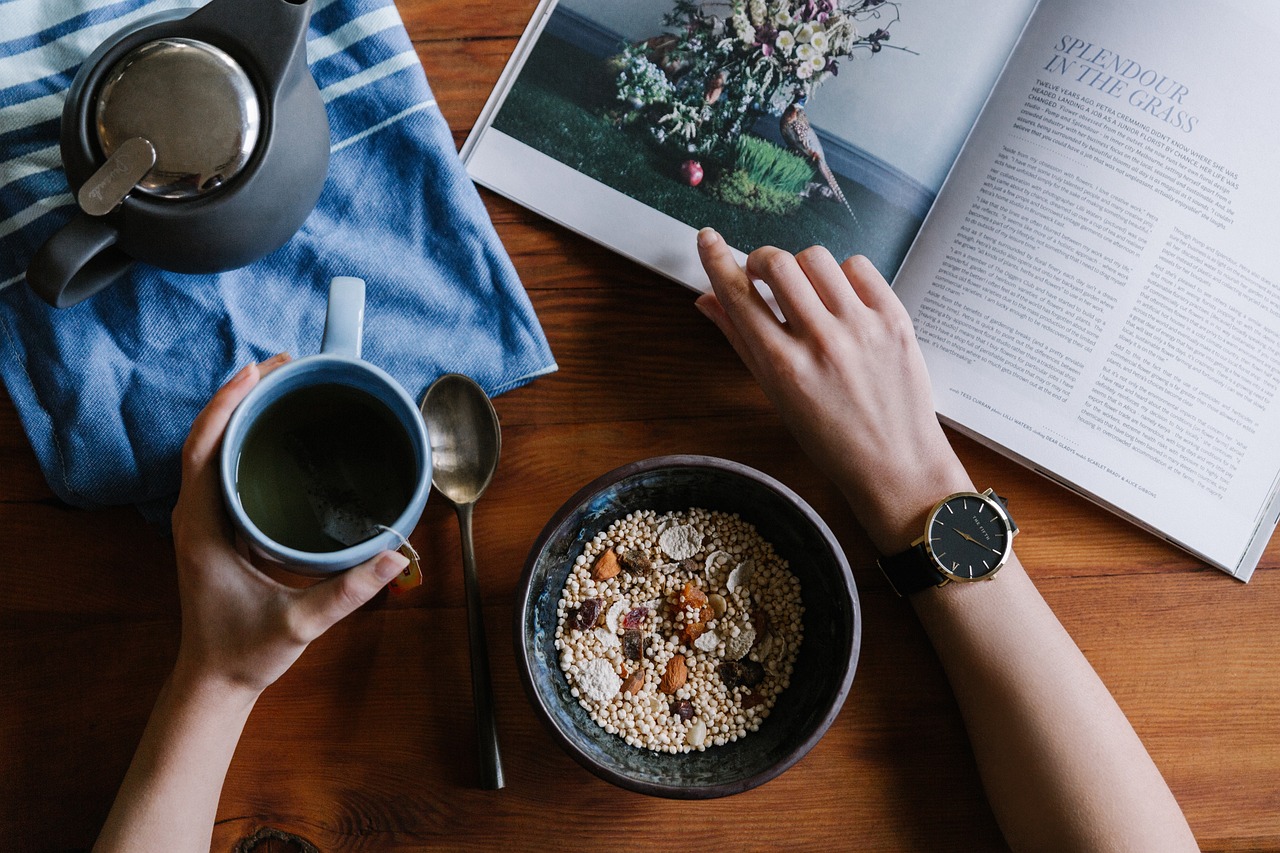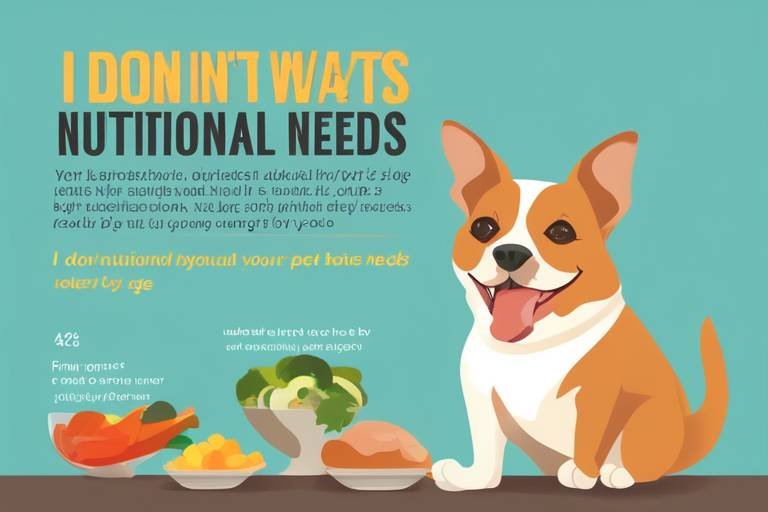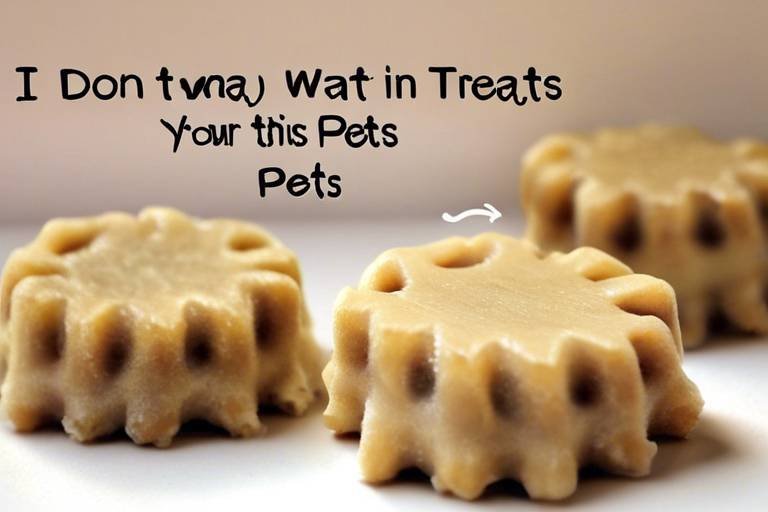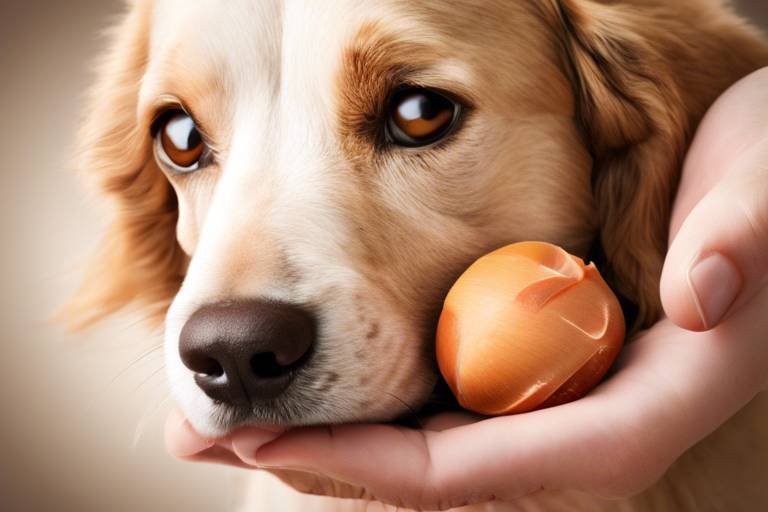The Best Foods for Your Pet's Skin Health
When it comes to our furry friends, their skin health is often an overlooked aspect of their overall well-being. Just like humans, pets can suffer from skin issues that can be uncomfortable and detrimental to their quality of life. The good news is that a balanced diet can play a crucial role in keeping your pet's skin healthy and vibrant. In this article, we will dive into the various dietary options that can enhance your pet's skin health, focusing on essential nutrients, beneficial food types, and practical dietary tips. So, whether you have a playful pup or a cuddly kitten, read on to discover how you can help keep their skin glowing and healthy!
Understanding the key nutrients that promote skin health in pets is crucial. Just like a well-tended garden needs the right soil and sunlight, your pet's skin thrives on the right nutrients. Omega fatty acids, vitamins, and minerals are the building blocks of a healthy coat and skin. Omega-3 and Omega-6 fatty acids, for instance, are known for their anti-inflammatory properties, which can help soothe irritated skin. Meanwhile, vitamins A and E are essential for maintaining skin elasticity and hydration. Zinc, on the other hand, is a mineral that supports skin regeneration and healing. By ensuring your pet's diet is rich in these nutrients, you can significantly improve their skin condition.
Now that we know what nutrients are essential, let’s explore some specific foods that can benefit your pet's skin. Incorporating foods like fish, sweet potatoes, and leafy greens into their diet can provide the necessary nutrients for optimal skin health. These foods not only taste great but also deliver a powerhouse of vitamins and minerals. For example, sweet potatoes are rich in beta-carotene, which is converted into vitamin A in the body, promoting healthy skin. Leafy greens, such as spinach and kale, are packed with antioxidants that help combat skin damage.
One of the most important nutrients for skin health is Omega-3 fatty acids. These essential fats are vital for reducing inflammation and promoting skin hydration. Foods rich in Omega-3 fatty acids can significantly improve your pet's skin condition, making it look shiny and healthy. Incorporating these fats into your pet's diet can be as simple as adding a bit of fish or flaxseed oil.
Fish like salmon and sardines are excellent sources of Omega-3 fatty acids. Including these in your pet's diet can lead to noticeable improvements in their skin and coat. Not only do these fish provide essential fats, but they are also rich in protein, making them a complete meal option. If your pet enjoys fish, consider adding it to their meals a couple of times a week to reap the benefits.
If you prefer plant-based options, flaxseed and chia seeds are great sources of Omega-3 fatty acids. These seeds can be easily added to your pet’s meals for a nutritional boost. Just a sprinkle can make a world of difference, providing the necessary fatty acids without the need for fish. Plus, they are packed with fiber, which is an added bonus for digestive health!
Vitamins A, E, and zinc are essential for skin health. These nutrients help in cell regeneration and protect the skin from damage. Vitamin A is particularly important for maintaining skin integrity and moisture, while Vitamin E acts as an antioxidant that can prevent skin damage caused by free radicals. Zinc plays a critical role in healing and repairing skin, making it a must-have in your pet's diet.
Preparing homemade meals can ensure your pet receives all the necessary nutrients for skin health. Knowing what ingredients to include can make a significant difference. When crafting a diet for your pet, consider incorporating a variety of protein sources, vegetables, and healthy fats. This approach not only enhances flavor but also provides a well-rounded nutrient profile.
Creating balanced recipes with protein, vegetables, and healthy fats is essential. For instance, a simple recipe could include cooked chicken, sweet potatoes, and spinach, all mixed together to create a nutritious meal. This not only helps in providing all the needed nutrients for skin health but also ensures your pet enjoys their meals. Remember, variety is key to keeping your pet interested in their food!
Before making dietary changes, consulting a veterinarian is important. They can guide you in formulating a diet that best suits your pet’s specific needs. Every pet is unique, and what works for one may not work for another. A veterinarian can help tailor a diet plan that takes into account your pet's age, breed, and any existing health conditions, ensuring that they receive the best care possible.
- What are the signs of skin problems in pets? Look for excessive scratching, redness, flakiness, or changes in coat quality.
- Can I give my pet fish oil supplements? Yes, but consult your vet for the appropriate dosage.
- Are there any foods I should avoid? Yes, avoid foods that are high in fillers and artificial additives, as they can exacerbate skin issues.

Essential Nutrients for Skin Health
When it comes to keeping your furry friend's skin healthy and radiant, understanding the essential nutrients is absolutely crucial. Just like us, pets need a balanced diet to maintain not only their overall health but also the condition of their skin and coat. So, what are these magical nutrients that can help your pet shine like a star? Well, let’s break it down!
First and foremost, Omega fatty acids are at the top of the list. These incredible fats are known for their anti-inflammatory properties, which can help to soothe irritated skin and combat dryness. Imagine omega fatty acids as a refreshing drink of water for your pet’s skin, quenching its thirst and keeping it hydrated. Foods like fish, flaxseed, and chia seeds are packed with these beneficial fats, making them a fantastic addition to your pet's diet.
Next up, we have vitamins, particularly Vitamins A and E. Vitamin A is essential for skin cell regeneration, helping your pet's skin stay youthful and vibrant. On the other hand, Vitamin E acts as a powerful antioxidant, protecting the skin from damage caused by free radicals. Think of these vitamins as the bodyguards for your pet's skin, defending it against harmful elements. Foods rich in these vitamins include carrots, spinach, and sweet potatoes.
Moreover, we can't overlook the importance of minerals, especially zinc. Zinc plays a pivotal role in maintaining skin integrity and structure. Without it, your pet might suffer from skin issues like dryness and irritation. Including foods like pumpkin seeds and chickpeas in their diet can help boost zinc levels.
In summary, to keep your pet's skin in tip-top shape, focus on a diet rich in:
- Omega fatty acids (found in fish and seeds)
- Vitamins A and E (found in colorful vegetables)
- Zinc (found in nuts and legumes)
By ensuring your pet gets these essential nutrients, you’re not just feeding them; you’re nurturing their skin health. It’s like giving them a little spa treatment from the inside out! Remember, a well-nourished pet is a happy pet, and their skin will thank you for it.

Top Foods for Healthy Skin
When it comes to keeping your pet's skin healthy, the right diet can make all the difference. Just like us, pets require a balanced intake of nutrients to maintain a vibrant coat and healthy skin. Some foods are particularly rich in beneficial compounds that can enhance skin health, and incorporating these into your furry friend's meals can lead to remarkable results. Imagine your pet strutting around with a shiny coat, free from irritation and dryness—sounds great, right? Let's dive into some of the best foods that can help achieve this!
First on the list is fish. Not just any fish, but fatty fish like salmon and sardines, which are packed with omega-3 fatty acids. These essential fats are known for their anti-inflammatory properties, which can help soothe itchy skin and reduce redness. Plus, they contribute to a shiny coat that will have your pet turning heads at the dog park! A simple addition of cooked salmon or sardines to your pet's diet can work wonders. Just be sure to remove any bones and cook the fish thoroughly to keep it safe.
Next up, we have sweet potatoes. These delicious tubers are not only a hit with many pets but are also loaded with vitamins A and C, both of which are vital for skin health. Vitamin A plays a crucial role in skin cell production and repair, while vitamin C helps protect the skin from oxidative damage. You can serve them mashed, baked, or even as a treat, ensuring your pet gets a healthy dose of nutrients in a tasty form.
Don't forget about leafy greens! Foods like spinach and kale are not just for humans; they can be a fantastic addition to your pet's diet too. These greens are rich in antioxidants, vitamins, and minerals that support overall skin health. You might be surprised to learn that many pets enjoy the taste of these veggies when mixed into their meals. Just chop them up finely and mix them into your pet's food for an extra health boost.
Now, let's not overlook nuts and seeds. Flaxseeds and chia seeds, for instance, are excellent sources of omega-3 fatty acids as well. They can easily be sprinkled over your pet's food, providing a crunchy texture that many pets enjoy. These tiny powerhouses also come with a host of other nutrients, including fiber and protein, making them a great supplement to your pet's diet.
Incorporating these foods into your pet's diet doesn't have to be complicated. You can mix and match them to create a variety of meals that will keep your pet excited about mealtime while also promoting healthy skin. For instance, a meal could consist of grilled salmon, a side of mashed sweet potatoes, and a sprinkle of flaxseeds. It’s a feast that’s not only delicious but also packed with nutrients!
To sum up, ensuring your pet has a diet rich in the right foods can lead to healthier skin and a shinier coat. By focusing on ingredients like fish, sweet potatoes, leafy greens, and nuts or seeds, you're setting your furry friend up for success. Remember, a happy pet is a healthy pet, and their skin health is a crucial part of their overall well-being!
Omega-3 Fatty Acids
When it comes to your pet's skin health, are like the superheroes of nutrition! These essential fats are not just buzzwords; they play a crucial role in maintaining a shiny coat and healthy skin. Imagine omega-3s as the soothing balm that calms inflammation and keeps your pet’s skin hydrated. Just like how our skin benefits from moisturizers, pets require these fatty acids to combat dryness and irritation. You might be wondering, "Where can I find these magical nutrients?" Well, let’s dive into some of the best sources!
One of the most effective ways to boost your pet's omega-3 intake is through their diet. Fish, particularly salmon and sardines, are packed with these beneficial fatty acids. Not only do they taste great, but they also promote skin elasticity and overall health. You could think of fish as nature's little gift to your furry friend! But wait, if your pet isn't a fan of fish, don’t fret! There are also plant-based sources that can easily be added to their meals.
Consider incorporating flaxseed and chia seeds into your pet's diet. These tiny powerhouses are rich in omega-3s and can be sprinkled on their food without any fuss. Just a small amount can make a significant difference in your pet's skin condition. It's like adding a sprinkle of magic that transforms their health from the inside out!
Now, you might be curious about how much omega-3 your pet actually needs. While it varies depending on their size and breed, a general guideline is to aim for around 1000 mg of omega-3 fatty acids for every 10 kg of body weight. However, it’s always a good idea to consult with your veterinarian to tailor the right amount for your pet.
In summary, omega-3 fatty acids are essential for your pet’s skin health. They help reduce inflammation, enhance hydration, and improve overall skin quality. By including fish and plant-based sources in their diet, you can ensure that your furry friend has the glowing, healthy skin they deserve. Remember, a happy pet is a healthy pet!
- What are omega-3 fatty acids? Omega-3 fatty acids are essential fats that are crucial for maintaining your pet's skin health and overall well-being.
- How can I include omega-3s in my pet's diet? You can include omega-3s by feeding your pet fish like salmon and sardines or adding flaxseed and chia seeds to their meals.
- How much omega-3 should my pet consume? A general guideline is about 1000 mg of omega-3 for every 10 kg of body weight, but it's best to consult your veterinarian for specific recommendations.
- Are there any side effects of too much omega-3? While omega-3s are beneficial, excessive amounts can lead to issues such as diarrhea or an upset stomach. Moderation is key!
Fish Options
When it comes to enhancing your pet's skin health, fish is not just a delicious treat; it's a powerhouse of essential nutrients! Rich in omega-3 fatty acids, fish like salmon and sardines can make a world of difference in the condition of your furry friend's skin and coat. These fatty acids are known for their anti-inflammatory properties, which can help soothe irritated skin and prevent dryness. Imagine your pet's skin being like a well-watered garden; with the right nutrients, it can flourish!
Salmon, in particular, is a fantastic source of not only omega-3s but also high-quality protein, which supports overall health. It's like giving your pet a gourmet meal that also doubles as a health supplement! On the other hand, sardines are smaller fish packed with nutrients that are often more affordable and can be easily included in your pet's diet. These little fish are like treasure chests, filled with vitamins and minerals that promote skin vitality.
But wait, there's more! If you're looking to add variety to your pet's diet, consider incorporating other fish options such as mackerel and herring. These fish not only provide similar benefits but also keep mealtime exciting for your pet. You can serve these fish cooked (without any seasoning) or even as treats, ensuring that your pet enjoys every bite while reaping the skin-loving benefits.
When selecting fish for your pet, always opt for fresh or canned varieties that are free from added salts or preservatives. It's crucial to ensure that the fish is properly sourced to avoid any potential contaminants. You wouldn't want your beloved pet to be exposed to harmful substances, right? Always prioritize quality over quantity!
In summary, incorporating fish into your pet's diet is a simple yet effective way to promote healthy skin. Not only does it provide essential fatty acids, but it also adds flavor and excitement to your pet's meals. So, the next time you're at the grocery store or fish market, remember that a little salmon or sardine can go a long way in keeping your pet's skin glowing and healthy!
- Can I feed my pet raw fish? It's generally recommended to cook fish to eliminate harmful bacteria. Always consult your vet before making any dietary changes.
- How often should I include fish in my pet's diet? Fish can be included in your pet's diet a few times a week, but balance it with other protein sources.
- Are there any fish I should avoid? Yes, avoid fish high in mercury like shark and swordfish. Stick to safer options like salmon and sardines.
Plant-Based Sources
When it comes to promoting your pet's skin health, of omega-3 fatty acids are a fantastic option. These sources not only provide essential nutrients but also offer a variety of health benefits that can enhance your furry friend's overall well-being. Two of the most notable plant-based sources are flaxseed and chia seeds. Both of these superfoods are packed with omega-3s, which can help reduce inflammation and keep your pet’s skin moisturized and healthy.
Flaxseed is especially rich in alpha-linolenic acid (ALA), a type of omega-3 fatty acid that can be easily converted in your pet's body to the form they need. You can add ground flaxseed to your pet's food, but remember to use it in moderation, as too much can lead to digestive upset. Chia seeds are another excellent alternative; they're not only high in omega-3s but also loaded with fiber, protein, and antioxidants. When soaked in water, chia seeds form a gel-like substance that can be a fun and nutritious addition to your pet's meals.
Here's a quick comparison of these two fantastic plant-based sources:
| Plant-Based Source | Omega-3 Content (per 100g) | Additional Benefits |
|---|---|---|
| Flaxseed | 22g | High in fiber, supports digestive health |
| Chia Seeds | 17g | Rich in antioxidants, promotes hydration |
Incorporating these seeds into your pet's diet is simple. You can sprinkle them over their regular food or mix them into homemade treats. Just be sure to introduce any new food gradually to avoid any stomach discomfort. And while these plant-based sources are beneficial, they should complement a balanced diet that includes protein and other essential nutrients.
It's important to remember that not all pets may tolerate these additions well. Observing your pet’s reaction to new foods is crucial. If you notice any signs of allergies or digestive issues, it’s best to consult with your veterinarian before continuing. They can provide personalized recommendations based on your pet's health status and dietary needs.
- Can I give my pet flaxseed oil instead of whole flaxseed?
Yes, flaxseed oil can be a great alternative, but it lacks the fiber found in whole flaxseed. Use it in moderation. - How much chia seed should I give my pet?
A teaspoon for small pets and a tablespoon for larger dogs is a good starting point. Always monitor their reaction. - Are there any risks associated with plant-based omega-3s?
Generally, they are safe, but introducing them too quickly can cause digestive issues. Always consult your vet.
Vitamins and Minerals
When it comes to your pet's skin health, vitamins and minerals are like the unsung heroes of nutrition. Just like we need a balanced diet to keep our skin glowing, our furry friends require specific nutrients to maintain their skin health and overall well-being. Among these, Vitamins A, E, and zinc stand out as essential players in the game of skin care. Let’s dive deeper into how these nutrients work wonders for your pet’s skin.
Vitamin A is crucial for skin cell regeneration and repair. It helps maintain the integrity of the skin and promotes healthy coat growth. Without adequate Vitamin A, your pet may experience dry, flaky skin, which can lead to discomfort and itching. Foods rich in Vitamin A include carrots, sweet potatoes, and liver. These delicious options not only taste great but also provide the necessary boost to your pet's skin health.
Then we have Vitamin E, often referred to as the “skin vitamin.” This powerful antioxidant helps protect skin cells from oxidative damage caused by free radicals. It also plays a role in maintaining moisture levels in the skin, preventing dryness and promoting a shiny coat. Including sources of Vitamin E, such as spinach, almonds, or sunflower oil, can be beneficial. You might be surprised to learn that a sprinkle of sunflower oil over your pet's food can do wonders!
Zinc is another mineral that cannot be overlooked. It supports the immune system and plays a significant role in the healing of wounds. A deficiency in zinc can lead to a range of skin issues, including dermatitis and hair loss. To ensure your pet gets enough zinc, consider incorporating foods like pumpkin seeds, chickpeas, and beef into their diet. Just imagine how a sprinkle of pumpkin seeds can turn a regular meal into a nutrient-packed feast!
To summarize, here’s a quick look at the benefits of these nutrients:
| Nutrient | Benefits | Food Sources |
|---|---|---|
| Vitamin A | Skin cell regeneration, promotes healthy coat | Carrots, sweet potatoes, liver |
| Vitamin E | Protects skin cells, maintains moisture | Spinach, almonds, sunflower oil |
| Zinc | Supports immune system, aids in healing | Pumpkin seeds, chickpeas, beef |
Incorporating these essential vitamins and minerals into your pet’s diet is a surefire way to enhance their skin health. Remember, a happy pet is a healthy pet, and their skin is a reflection of their overall well-being. So, the next time you’re at the pet store or grocery shopping, keep an eye out for these nutrient-rich foods. Your furry friend will thank you with a wagging tail and a shiny coat!
Q: How do I know if my pet is getting enough vitamins and minerals?
A: Look for signs such as a shiny coat, healthy skin, and overall vitality. If you notice issues like excessive shedding, dryness, or irritation, it may be time to reassess their diet.
Q: Can I give my pet vitamin supplements?
A: While supplements can be beneficial, it’s best to consult with your veterinarian before introducing any new supplements into your pet’s diet to ensure they are necessary and safe.
Q: Are there any foods I should avoid for my pet's skin health?
A: Yes, avoid foods high in fillers, artificial additives, and excessive grains, as these can contribute to skin issues. Always opt for high-quality, natural ingredients.

Homemade Diets for Skin Health
When it comes to ensuring your pet's skin health, homemade diets can be a game changer. Crafting meals at home allows you to have complete control over the ingredients, ensuring that your furry friend gets all the essential nutrients they need. Just like humans, pets can benefit immensely from a diet rich in vitamins, minerals, and fatty acids. But what exactly should you include in their meals to promote healthy skin? Let’s dive into some key components!
First off, it’s crucial to understand that a well-balanced diet for your pet should include a combination of proteins, vegetables, and healthy fats. Proteins help in the repair and regeneration of skin cells, while vegetables provide antioxidants that combat skin damage. Healthy fats, especially omega-3 fatty acids, are vital for maintaining skin hydration and reducing inflammation. So, what are some great ingredients to consider?
| Ingredient | Benefits |
|---|---|
| Salmon | Rich in omega-3 fatty acids, promotes skin hydration. |
| Sweet Potatoes | High in beta-carotene, supports skin health and immune function. |
| Carrots | Packed with antioxidants, helps in maintaining skin elasticity. |
| Spinach | Rich in vitamins A, C, and K, supports overall skin health. |
| Flaxseed | A great source of omega-3 for skin hydration. |
Incorporating these ingredients into your pet's meals can make a significant difference in their skin health. For example, a simple recipe might include baked salmon with a side of mashed sweet potatoes and steamed spinach. This not only provides a delicious meal but also a powerhouse of nutrients that your pet's skin will thank you for!
However, while homemade diets can be incredibly beneficial, it’s vital to ensure that they are well-balanced. Each pet has unique dietary needs based on their age, size, and health condition. Therefore, before you start whipping up those homemade meals, it’s always a good idea to consult a veterinarian. They can help you formulate a diet that meets your pet’s specific requirements and ensure that you’re not missing out on any essential nutrients.
In conclusion, homemade diets can significantly enhance your pet's skin health, provided they are balanced and nutrient-rich. By adding the right ingredients and consulting with a vet, you can create meals that not only taste great but also contribute to a glowing, healthy coat. So why not give it a try? Your pet deserves the best!
- Can I feed my pet only homemade food? - It's essential to ensure that homemade meals are balanced and meet all nutritional needs. Consulting a vet is crucial.
- How do I know if my pet's skin is healthy? - Look for a shiny coat, no excessive itching, and no signs of redness or irritation.
- Are there any foods I should avoid? - Yes, some foods like chocolate, onions, and garlic can be harmful to pets. Always check with your vet.
Balanced Recipes
Creating for your furry friend is like crafting a masterpiece; it requires the right combination of ingredients to ensure they receive all the essential nutrients for optimal skin health. A well-rounded meal should include a mix of high-quality protein, vibrant vegetables, and healthy fats. Think of it as a colorful palette where each ingredient plays a vital role in enhancing your pet's overall well-being.
For instance, start with a protein source, such as chicken, turkey, or beef. These proteins are not just tasty; they are crucial for repairing skin cells and maintaining a shiny coat. Next, incorporate a variety of vegetables. Sweet potatoes are a fantastic choice—they're packed with vitamins A and C, which are known to support skin health. You might also consider adding leafy greens like spinach and kale, which are rich in antioxidants and help combat skin issues.
But wait, we can't forget about healthy fats! Oils like olive oil or coconut oil can be drizzled over your pet's meal to provide those necessary omega fatty acids. These fats are essential for keeping the skin hydrated and reducing inflammation. To make this process easier, here’s a simple balanced recipe you can try:
| Ingredient | Quantity | Benefits |
|---|---|---|
| Chicken (boneless, skinless) | 1 cup | High-quality protein for skin repair |
| Sweet Potato (mashed) | 1/2 cup | Rich in vitamins A and C |
| Spinach (chopped) | 1/4 cup | Antioxidants for skin protection |
| Olive Oil | 1 tablespoon | Healthy fats for hydration |
Mix these ingredients together and serve them warm. Your pet will not only enjoy the delicious flavors but will also benefit from a meal that supports their skin health. Remember, the key is to maintain a balance. Too much of one ingredient can lead to deficiencies in others, so aim for variety!
Lastly, it’s crucial to keep in mind that every pet is unique. What works for one might not work for another. Therefore, consulting a veterinarian before introducing new recipes is always a wise choice. They can help tailor your pet's diet to their specific needs, ensuring that every meal contributes positively to their skin health.
- What are the signs of poor skin health in pets? Look for excessive scratching, redness, or flaky skin. A dull coat can also indicate issues.
- Can I use store-bought food for skin health? Yes, but always check the labels for omega fatty acids and essential vitamins.
- How often should I feed my pet homemade meals? It depends on your pet’s dietary needs. A vet can provide personalized guidance.
Consulting a Veterinarian
When it comes to your pet's health, especially regarding their skin, is one of the best decisions you can make. Just like us, pets have unique dietary needs that can vary based on their age, breed, and health status. A veterinarian can provide tailored advice that considers these factors, ensuring your furry friend gets the right nutrients for optimal skin health.
Before making any significant changes to your pet's diet, it’s crucial to have a conversation with a vet. They can help you understand what specific ingredients your pet might need to thrive. For example, if your dog has allergies or sensitivities, the vet might recommend a specialized diet that avoids common allergens. This tailored approach not only promotes better skin health but also enhances your pet's overall well-being.
Moreover, a veterinarian can offer insights into commercial pet foods versus homemade diets. While many pet owners enjoy the idea of preparing meals at home, it’s essential to ensure that these meals are nutritionally balanced. A vet can guide you on how to create a well-rounded diet that includes all necessary vitamins and minerals, making sure your pet is not missing out on anything vital.
Additionally, regular check-ups with your veterinarian can help monitor your pet’s skin condition and dietary effectiveness. If you notice any changes in your pet's skin, such as excessive itching, redness, or patches, it’s time to consult your vet again. They can recommend dietary adjustments or treatments that can alleviate these issues.
In summary, your veterinarian is your best resource for ensuring your pet's skin health through diet. They can provide valuable recommendations, help you avoid potential pitfalls in homemade meals, and keep track of your pet's progress. So, don’t hesitate to reach out to your vet whenever you have questions or concerns about your pet's diet and skin health!
- How often should I consult my veterinarian about my pet's diet?
It's a good idea to have a check-up at least once a year, but if you notice any skin issues or changes in behavior, consult your vet sooner. - Can I feed my pet human food for better skin health?
Some human foods are safe for pets, but always check with your vet first to avoid harmful ingredients. - What signs indicate my pet might need a dietary change?
Look for signs such as dry skin, excessive shedding, itching, or any skin irritations.
Frequently Asked Questions
- What are the best foods for improving my pet's skin health?
Foods rich in omega-3 fatty acids, such as fish like salmon and sardines, are fantastic for your pet's skin. Additionally, incorporating sweet potatoes and leafy greens can provide essential vitamins and minerals that promote skin health.
- How do omega-3 fatty acids benefit my pet's skin?
Omega-3 fatty acids are essential for reducing inflammation and keeping your pet's skin hydrated. These nutrients help combat dryness and irritation, leading to a healthier and shinier coat.
- Can I prepare homemade meals for my pet to improve their skin condition?
Absolutely! Homemade diets can be tailored to include all the necessary nutrients for skin health. Just ensure your recipes are balanced with protein, vegetables, and healthy fats to meet your pet's dietary needs.
- What vitamins and minerals are crucial for my pet's skin health?
Vitamins A, E, and zinc play significant roles in maintaining skin health. They aid in cell regeneration and help protect the skin from damage, ensuring your furry friend has a vibrant coat.
- Should I consult a veterinarian before changing my pet's diet?
Yes, consulting a veterinarian is always a wise move! They can provide personalized advice and help you formulate a diet that best suits your pet’s specific needs, ensuring they get the right nutrients for optimal skin health.


















